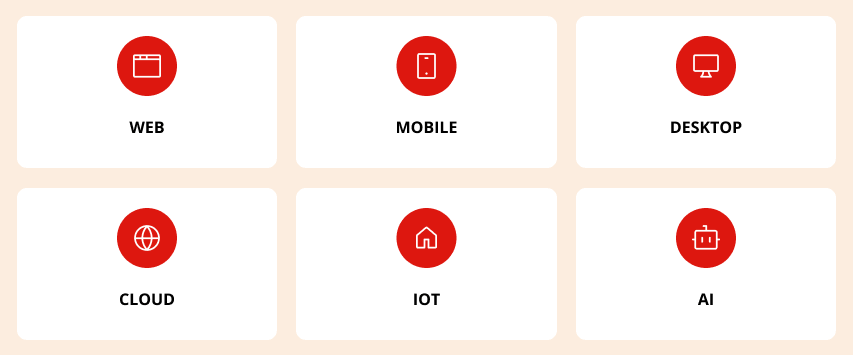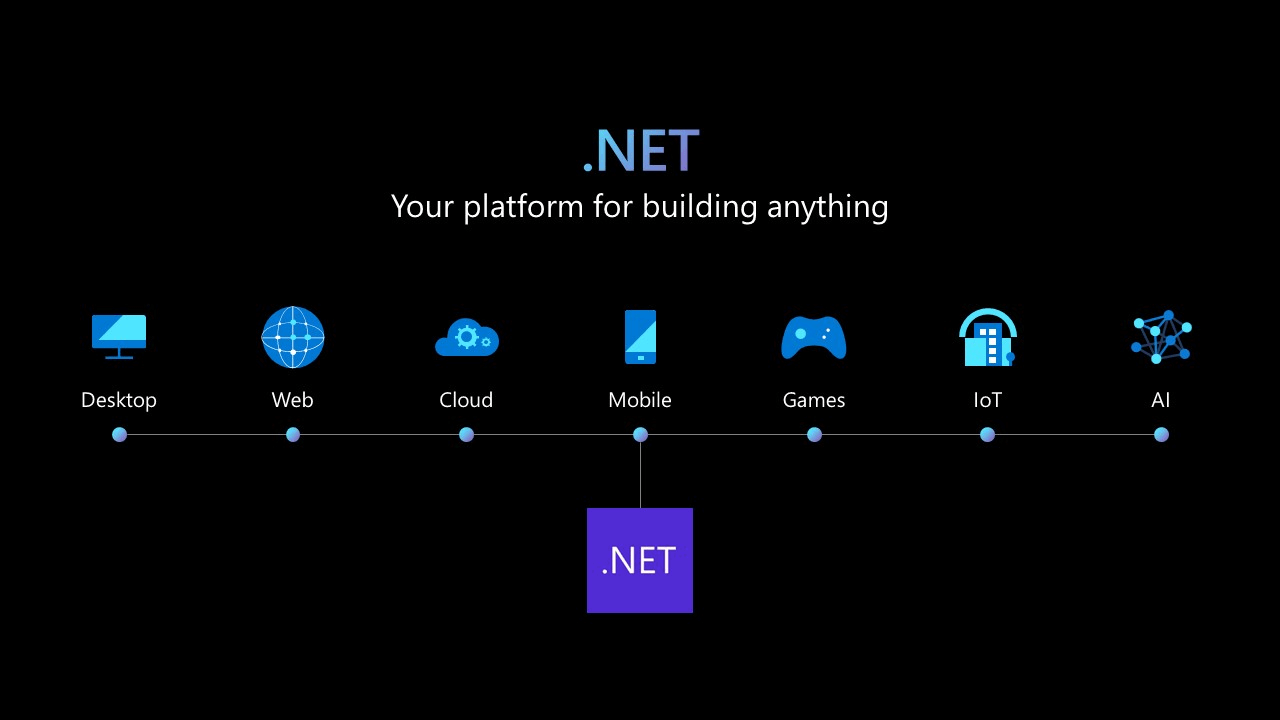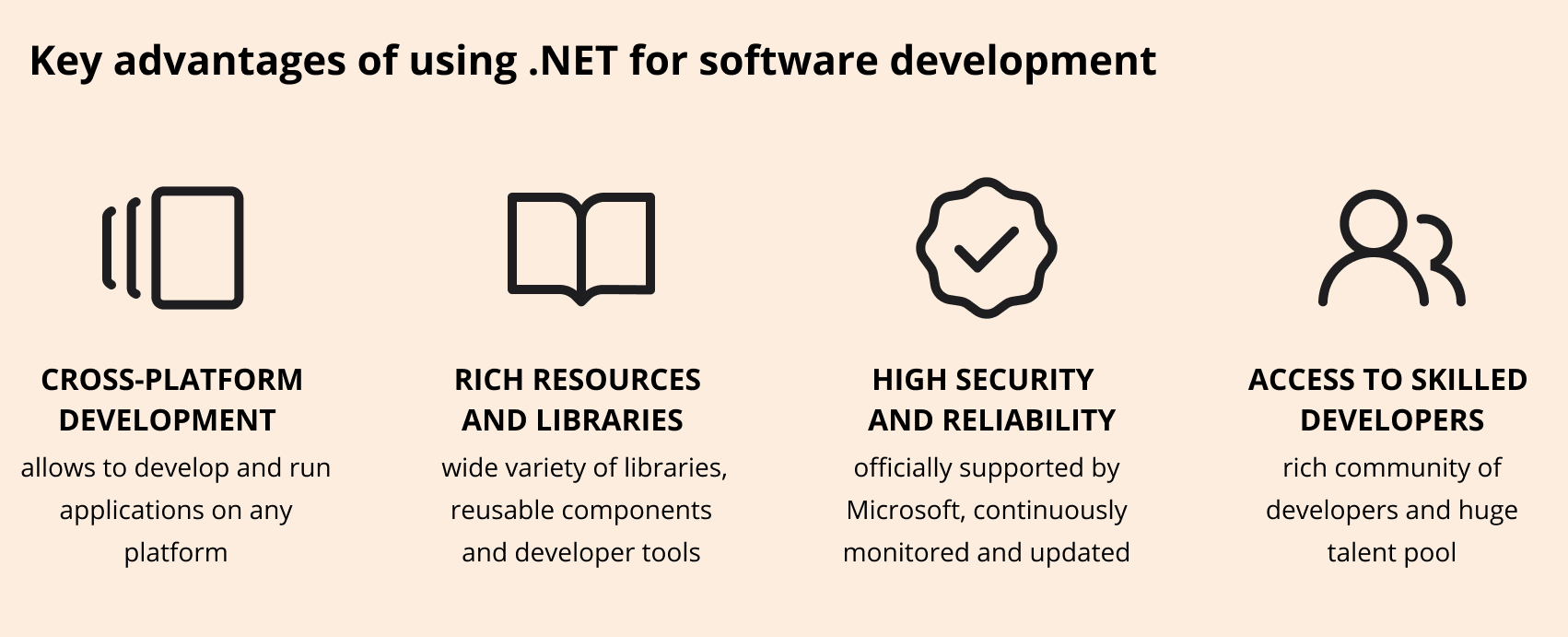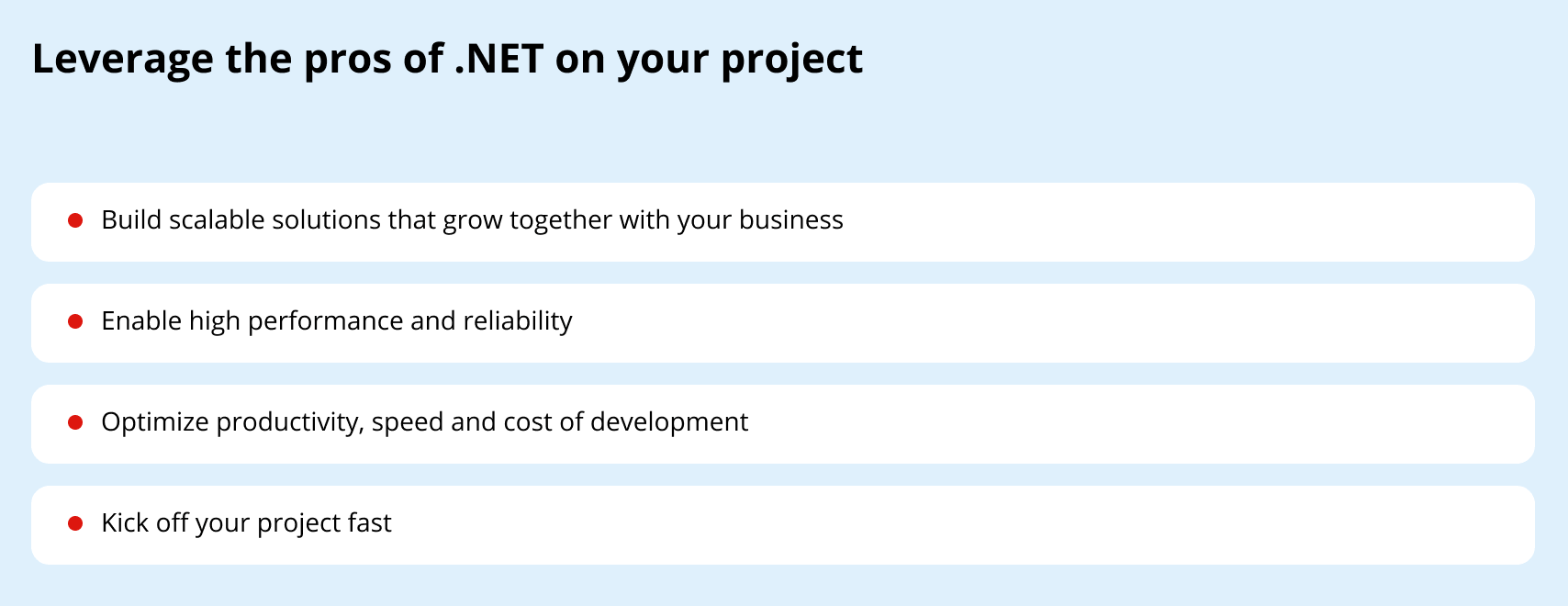Why Use .NET Platform: Advantages for Your Product Development
Developers love .NET. It is a mature, versatile and resourceful platform for fast and efficient engineering. But how do these and many other advantages of .NET translate into benefits for business? Let’s find out.
In this article, we talk about the benefits of dot NET technology and explain why this platform is one of the top choices for building high-performing, scalable applications for business. You will learn what .NET is good for, why choose .NET, and what problems you can expect should you decide to use this platform on your project.
What is .NET?
.NET is a developer platform that allows you to build applications for web, mobile, desktop, IoT, microservices, cloud or anything else. It is free and fully open source since 2014. Officially released by Microsoft back in 2002, this platform now has over 100k contributors worldwide and is used to build software for such companies as Dell, UPS, and GE Aviation.

As a developer platform, .NET includes libraries, reusable components, programming languages and a variety of tools that help engineers develop, compile and deploy modern software for virtually any niche.
It may be too easy to get lost in .NET versions and frameworks. We’ll provide just a quick roundup on what is widely used to develop .NET-based software.
Programming languages
C#, F#, Visual Basic are native .NET programming languages, though the platform supports dozens of other CLI-compliant languages.
Implementations
.NET Framework, .NET Core, ASP.NET and ASP.NET Core, Xamarin/Mono, .NET 6 and released in November 2023 .NET 8 are all different implementations and frameworks for cross-platform development.
-
- .NET Framework is the original implementation of .NET that allows to build and run web and desktop applications and services on Windows.
- .NET Core is a .NET Framework successor that expands to other platforms and allows to develop software for Windows, Linux and macOS.
- ASP.NET and ASP.NET Core are the frameworks for building dynamic websites and web applications, ASP.NET Core being the later version and an integral part of .NET Core implementation.
- Xamarin is .NET implementation for building and running mobile applications.
- .NET 5 is a unified platform that combines the capabilities and advantages of .NET implementations we’ve mentioned previously and provides seamless development experience. Simply put, .NET 5 provides an environment and tools to build any type of application for any platform, including web, mobile, cloud and IoT. Since its release in 2020, the term Core is no longer used for the latest implementations.
- .NET 7 and .NET 8 are the latest and fastest .NET that, according to the official release notes, have massive performance improvements.

Image credit: Microsoft
Why use .NET?
Why is the .NET framework beneficial and loved by so many engineers? Because it covers all bases. We have already mentioned that modern .NET is cross-platform, versatile and incredibly resourceful. Being on the market for 20 years, .NET platform evolved into a universal programming environment for designing, developing, compiling, testing and deploying high-performing applications of any scale.
It is now fully open source and has one of the biggest programming communities.
To better understand how it affects an actual project and reflects on its progress and, eventually, the bottom line, let’s delve into the advantages of using .NET in detail.

Cross-platform development
Whether you need a toolkit for building a lightweight web application or custom platform development, .NET is your go-to choice. One of the biggest benefits of .NET frameworks and implementations is that they allow to create and run code on different platforms using one programming environment and set of tools.
Rich resources and libraries
Where should we start? .NET is a huge ecosystem with a wide variety of libraries, developer tools and methods that help engineers quickly find solutions to given tasks and therefore develop applications faster.
One example is a feature-rich Visual Studio — everybody’s favorite integrated developer environment (IDE) that, together with Visual Studio Code editor, was ranked top according to the 2023 Stack Overflow Survey. Along with a set of libraries, extensions and collaboration tools, they provide engineers with everything they need to write code, compile, debug, and publish applications effectively.
A broad variety of libraries and easy-to-use management tools are important advantages of .NET. The platform boasts a large volume of reusable open-source code, components and modules that developers can explore and use on their projects. Thanks to NuGet package manager — another developers’ favorite — these libraries and components are easy to find, share and integrate into the project.
High security and reliability
Microsoft officially supports .NET and therefore guards its security and reliability, provides guidelines and responds to threats should they arise.
Access to skilled developers
For years, one of the strongest .NET framework benefits has been a large-scale market and accessibility to skilled talent. According to rough estimates, there are 5 to 8 million .NET developers in the world many of whom are seniors with 10+ years of experience working and evolving with this technology. This is good news for everyone who’s looking for hiring .NET developers team with a proven track record.
Ready to start your .NET project? Or interested in further exploring .NET advantages and disadvantages to make the right choice for your tech stack? .NET is our core tech expertise, and we are ready to answer all your questions and help you leverage the advantages of .NET on your project. Learn about our .NET software development services and contact our team to talk about your project!
Contact Digiteum
Anything. A mature and rich .NET ecosystem allows you to use the same environment and skills to build anything from mobile games on Unity to cloud-based enterprise applications that leverage the advantages of .NET and Azure.
So what is .NET good for?
Powerful web applications and services
.NET offers a full toolkit to design and build scalable web systems from cloud-based SaaS to interactive web apps. Stack Overflow, developers’ favorite community space and a well-known evangelist of .NET, has built its entire infrastructure on .NET. During their journey, they have leveraged the huge performance boost of .NET Core and seamless migration to Azure and microservices.
Native apps
Using Xamarin implementation and one set of skills, you can build native applications and cross-platform interfaces for any mobile operating system. BBC Good Food exploits this advantage to deliver content and services to millions of users on their native iOS, Android and UWP apps. Thanks to these .NET development strategies, they could build their apps much faster while keeping a native look and feel.
Cloud-based and IoT platforms
.NET is an ideal companion for cloud-native applications, specifically Azure-based development. After years of reaping the advantages of .NET framework, Siemens Healthineers paired Azure and .NET Core to create a data-driven ecosystem for secure healthcare data analysis and management. Thanks to resourceful Azure services and modern architecture, the system can serve customers globally while preserving a high level of security and local compliance.
Large enterprise applications
.NET is perfect for enterprise applications. It is stable, reliable, mature, and extensive, which means it will withstand a trial of time and has everything developers need to build solutions for any business problem. This is one of the reasons why GE Aviation chose .NET to build an application that would provide more than 3000 pilots with valuable data for secure, effective, and sustainable flights. Along with the benefits of using .NET Core, they powered their application with Azure, ASP.NET Core, and Blazor.
AI-powered applications
AI components of .NET framework, ML.NET and Azure Machine Learning, democratize AI technology and help companies integrate machine intelligence into their operations to increase productivity and cut costs. This is what a corporate law firm Williams Mullen did when they used ML.NET to tackle the big data challenges they were dealing with – multiple unstructured formats and a large volume of legal data unfit for machine analysis and processing. They used .NET AI tools to set up data classification and make it searchable and faster to manage, thus significantly boosting in-house productivity.
Before choosing .NET for your stack, you should consider both advantages and disadvantages of .NET frameworks and tools. Just like any other technology, it has its own specifics that may impact your decision. Here are a few:
- .NET is open source but it comes at a recurring cost of licenses for tools, IDEs and other services for each user.
- Transition from legacy .NET framework to newer versions may take its toll since not all the services and tools are supported anymore and were substituted.
- Some developers believe that Microsoft has a pretty tight grip on .NET even though it’s open source since 2014 and has a support of over 100k developers worldwide.
- You can build applications using .NET on any OS, but Windows is where it really shines.
Despite these minor complications, .NET remains one of the top developer platforms since the time of the first .NET Framework.
Abundant benefits of dot NET put this technology in the heart of many successful software products. Here’s how to leverage the pros of .NET development to build reliable, secure and fast applications.

Build scalable solutions that grow together with your business
The cross-platform nature and abundance of tools make .NET a perfect choice for building scalable software able to evolve and grow together with business. Using .NET, you can create cloud-based or enterprise server solutions, run and support high-load web applications and build up your microservices architecture.
Moreover, using a familiar .NET environment, your tech team can effectively scale to new platforms along with changing business needs and market requirements.
Enable high performance and reliability
Another reason to use .NET for building scalable products is its outstanding reliability and performance.
According to Microsoft itself and thousands of developers who support the platform, applications built on dot NET show fast response time and consume less computing power. These parameters are essential for distributed scalable applications that experience an increase in traffic and data workload.
With each new release, .NET is getting a serious boost in performance. It happened with every .NET Core version and .NET 5. The recent release of .NET 8 is also marked by ‘massive gains in performance’. How does it affect business outcomes? High-performing and fast applications:
- are secure and reliable;
- sustain an abnormal influx of traffic, number of requests, data;
- provide consistent user experience and contribute to high customer and client loyalty;
- are cheaper to host, maintain and support thanks to smarter use of resources.
Optimize productivity, speed and cost of development
From the very beginning, one of the biggest .NET framework advantages and goals was to provide engineers and businesses with an environment where they can build more with less time and resources.
Using rich libraries, open source code, reusable components, and a great toolkit, .NET development teams can build, compile and test code faster and more efficiently. Instead of searching for solutions for common problems or building code for typical features from scratch, engineers tap into extensive .NET resources and leverage the components that have already been built, tested and reused many times.
This significantly improves the speed of development and eventually, helps businesses optimize cost and gain an important advantage.
Kick off your project fast
.NET has brought up a generation of software engineers with an eclectic skill set. They work in a unified .NET environment and build applications for different platforms — web, mobile, desktop, cloud, IoT.
From a business standpoint, access to seasoned tech specialists is a guarantee to start the project as soon as possible and gain an invaluable competitive advantage. The faster you can develop, deliver and test your software in the field, the better your chances are to create a relevant product and occupy your space in the market.
Along with other advantages of .NET, this characteristic is particularly important for startups and cutting-edge tech companies. For them, speed, flexibility and promptness are often the key sources of success.
Are you already working with .NET platform? Or weighting the pros and cons of .NET development to choose an optimal tech stack for your project?
.NET is the core technology at Digiteum. We have over 14 years of experience working with diverse .NET frameworks and tools. Today, our senior full-stack engineers use .NET to build and support high-load web applications, scalable SaaS platforms, and leading-edge software for startups.
Here’s how we can help you achieve your business goals:
Augment your .NET team
Do you need to scale up your team? Perhaps, you plan to migrate to a new platform and need extra hands and brains? Our senior .NET engineers have extensive experience working with different .NET implementations and tools. We can help you develop and deliver your product faster and at optimal cost by adding our skills and providing the flexibility you need.
We always start with understanding your business goals, project requirements and expectations. Only then we can select and prequalify candidates that would match your requirements and fit your working environment and team mentality. Learn more about the process and benefits of augmenting your tech team with Digiteum.
Put together a dedicated team
Leverage .NET advantages with a full-stack dedicated team. This model works equally well for companies that have no in-house tech teams, lack certain domain or tech expertise or seek a cost and resource-efficient solution to build a software product from the ground up.
We have a decade-long experience in building reliable .NET dedicated teams that work with our clients for years. One of our major clients, a leading photo lab in the US, relies on a full-stack dedicated team at Digiteum to design, develop and support their feature-rich high-load web application.
Learn more about this success story or contact our team right away and tell us about your requirements for a dedicated team.
“The technological agility that the team provides is our biggest market strength. The project management, design, and development that they provide is second to none.” David Nicoletti, former CMO & Product Owner at Printique.
Start your project with Discovery
First step is always the hardest. This is why we often start growing a brand new software product with Discovery. Discovery is a wholesome research and ideation project that is mainly focused on creating a clear, data-driven development strategy. The benefits of the Discovery project are numerous. It helps you:
- better understand what, how and for whom you are developing your product;
- clarify and document requirements and select an optimal tech stack;
- set up priorities to optimize the cost and time of development;
- create a high-level design to visualize your ideas.
If you are not sure what to begin with, check our guide on starting a software project with Discovery and see if this is the right strategy for you to get off on the right foot.
Start your .NET project with Digiteum. Fill in a quick contact form and tell us about your project, business needs and requirements. Whether you are looking for a dedicated .NET development team to build your software product from scratch or need to augment your tech team to help you deliver your project faster, we have your back.
Contact Digiteum
.NET is a Swiss Army knife of software development. Large enterprises, 2-people startups and data-driven organizations has been weighing .NET framework advantages and disadvantages for over 20 years and favored .NET for its outstanding performance, security and productivity. Thanks to the support from Microsoft and a huge developer community, .NET will certainly not go obsolete anytime soon, making it a reliable choice for software development. In fact, if you are just starting your software project, chances are you consider .NET as a part of your core tech stack.
Still have questions on how to leverage the advantages of .NET? Drop us a line and our expert team will contact you shortly to discuss how we could help you with your project.
This post was originally published on December 6, 2021 and updated on January 13, 2023.
FAQ
- open source and free;
- productive, resourceful and high-performing;
- secure and reliable;
- supported by Microsoft and 100k developers worldwide;
- widely used by approximately 8 million software engineers.







